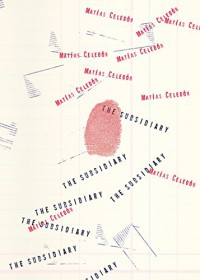Familiar Diversions
I'm a librarian who loves anime, manga, and reading a wide variety of genres.
Currently reading
The Subsidiary by Matías Celedón, translated by Samuel Rutter

I went into this looking for office/corporate horror. I suppose I got that, to a certain extent, but this turned out to be a much more artsy and experimental book than I had hoped for.
The book's gimmick is that it's written/produced using actual office stamps. As a result, each page usually only has about 1-4 short lines of text.
At the beginning, readers are told that this is being written by an office worker at the subsidiary, using only the stamps found around the office. On June 5, 2008, workers are told that there will be a power supply interruption between 8:30 AM and 8:00 PM and that they are to remain at their workstations. The doors are locked, and the phone lines are down. The power outage goes on for a good deal longer than planned, but things at the subsidiary become hellish for the women in only 24 hours, if I interpreted things correctly.
All characters were disabled in some way and were only referred to by their disabilities: the blind girl, the mute girl, the lame man, the one-eyed man, and the one-armed man. The narrator never spoke of himself in the third person, but he'd have been "the colorblind man." I got the impression that the narrator was forced to work for the subsidiary after being diagnosed with colorblindness, but the book's setup forced readers to do a lot of interpretation, so I could be wrong. For example, I disagree with those reviewers who thought that the dogs mentioned in the text were a literal pack of wild dogs running around in the building - I think it was a metaphor for the animalistic behavior of the workers.
While reading this, I was reminded of issue #6 of Neil Gaiman's Sandman, "24 Hours," in which customers and employees in a diner become increasingly animalistic and brutal over the course of 24 hours. However, I felt that Gaiman did it better. Things became nasty pretty quickly in both stories, but in Gaiman's there was a solid reason for it. In The Subsidiary, the reason seemed to be "it's dark and people are scared," but that didn't work for me. In only 24 hours, the narrator was telling the deaf girl to pay for the candle he gave her with sex. After three days, the lame man captured a boy who, from the sounds of things, he periodically raped. (I assumed all instances of "girl" actually meant "woman," since the deaf girl was another employee, but the one instance of "boy" seemed to indicate an underage character, in which case the lame man was a pedophile.)
There were no mentions of any of the practicalities of trying to survive in a building where the power had been cut and the doors locked so that no one could leave - nothing about food, water, restrooms, etc. Instead, the text's entire focus was on the things the characters did to each other, which culminated in one character's death. I'm not sure what Celedón was aiming for, but it didn't work for me on any level.
(Original review posted on A Library Girl's Familiar Diversions.)
 3
3












